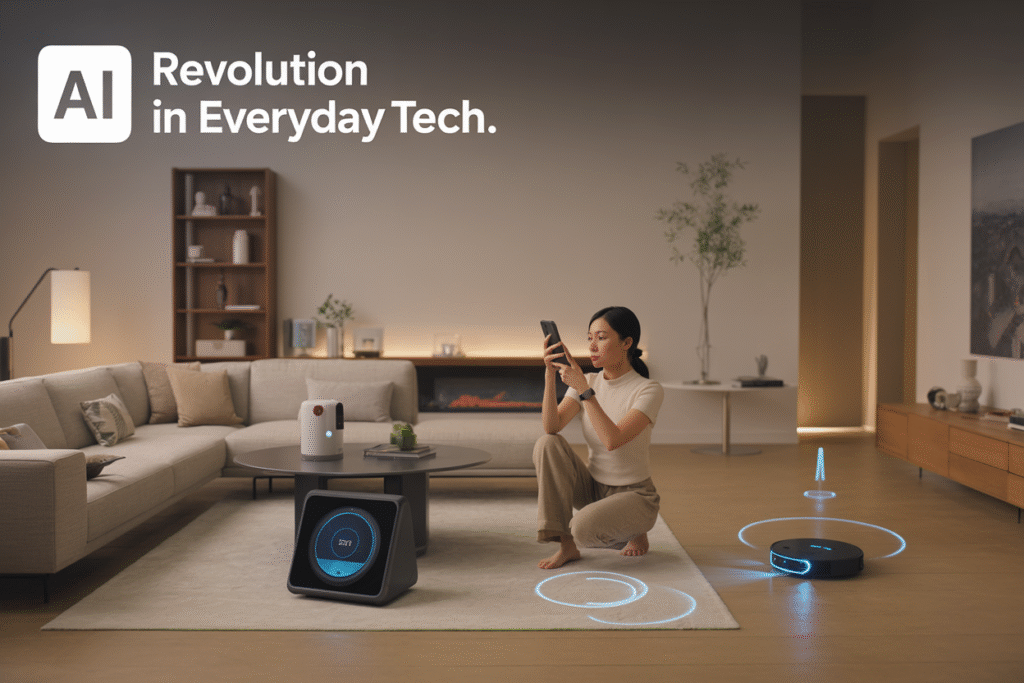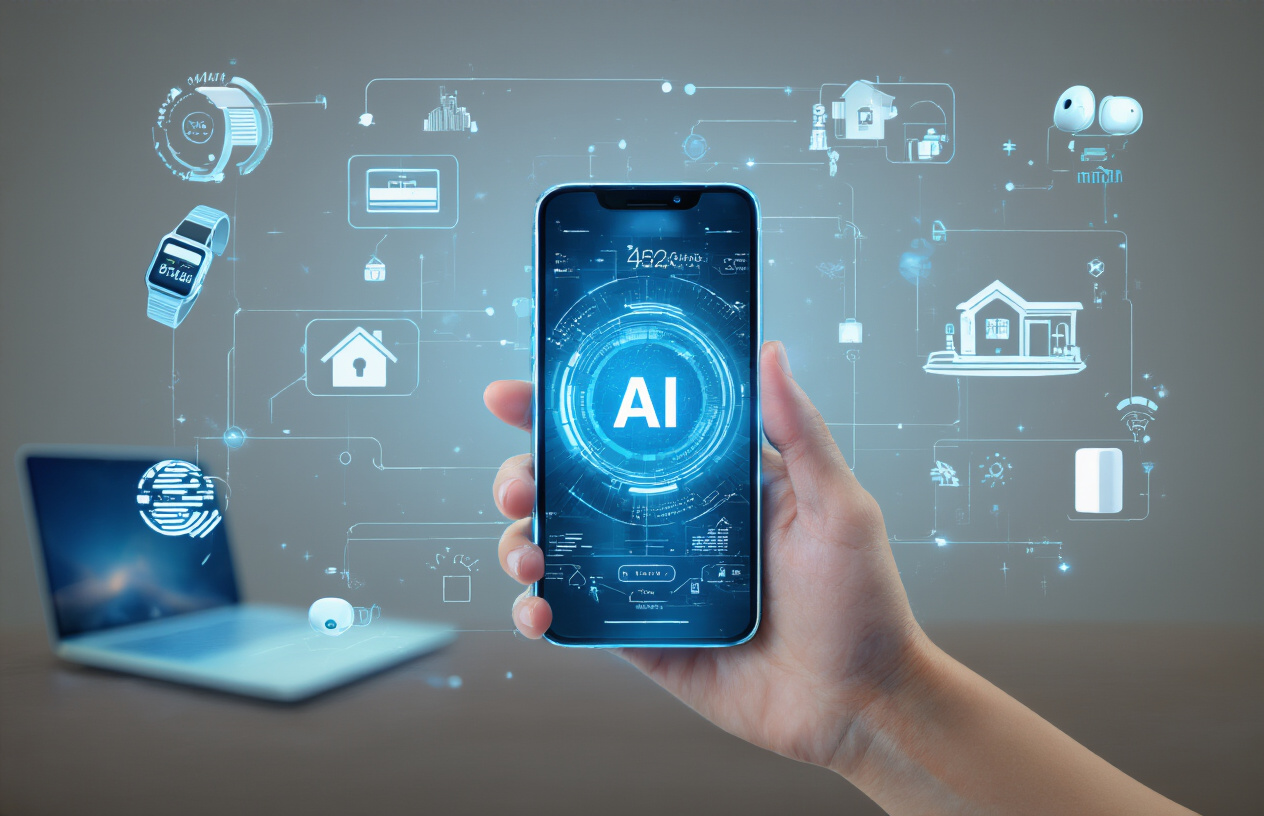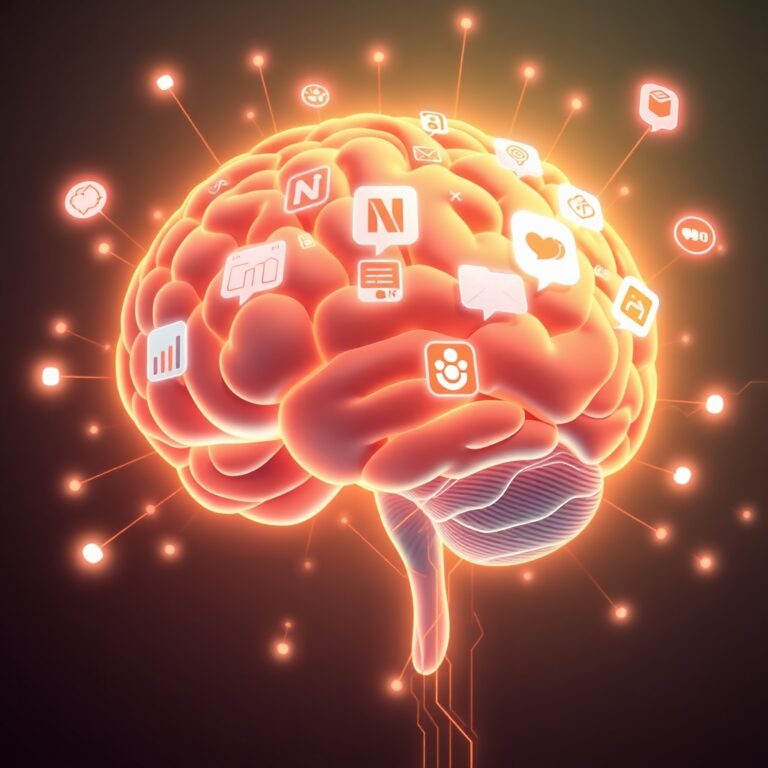
AI isn’t just for tech experts anymore—it’s changing the gadgets we use daily. For busy professionals and tech-curious consumers looking to upgrade their devices, this guide shows how artificial intelligence makes your favorite electronics smarter and more helpful. We’ll explore how smart wearables now deliver personalized health insights, how home assistants are becoming true security hubs, and why AI-powered robotic companions are simplifying household tasks like never before.
Understanding the AI Revolution in Consumer Electronics

Understanding the AI Revolution in Consumer Electronics
How AI Technology is Transforming Everyday Devices
Artificial Intelligence is seamlessly integrating into our daily lives through consumer electronics, fundamentally changing how we interact with technology. From virtual assistants like Siri, Alexa, and Google Assistant that understand voice commands to smart refrigerators that track food inventory and suggest recipes, AI is powering a new generation of intuitive devices.
Modern households now feature AI-driven security systems that use facial recognition to differentiate between family members and strangers, while robotic vacuum cleaners map home layouts and optimize cleaning patterns autonomously. These aren’t science fiction concepts anymore—they’re everyday realities that millions of consumers experience.
Transportation has been similarly revolutionized, with companies like Tesla developing self-driving vehicles that use AI-powered computer vision and deep learning algorithms to navigate roads safely. Meanwhile, apps like Google Maps leverage AI to analyze traffic patterns and suggest optimal routes in real-time.
Key Benefits: Personalization, Automation, and Energy Efficiency
The integration of AI into consumer electronics offers three primary advantages:
- Personalization: AI-powered devices learn user preferences over time, delivering increasingly tailored experiences. Smart assistants provide more personalized responses as they gather data about user habits, while wearable health devices monitor vitals and offer customized health insights.
- Automation: AI eliminates repetitive tasks by automating everything from home security monitoring to customer service interactions. Smart appliances adjust settings automatically based on usage patterns, while AI-powered thermostats like Nest learn user habits and optimize temperature settings without manual intervention.
- Energy Efficiency: Perhaps one of the most significant benefits is improved sustainability. AI-enabled lighting systems detect occupancy and adjust brightness accordingly to save electricity. Smart thermostats optimize energy consumption by learning user patterns, and AI integration with renewable energy sources ensures smarter household energy management.
The Shift from Science Fiction to Reality
What once existed only in the realm of science fiction has rapidly become everyday technology. Advanced humanoid robots like Tesla Optimus are being designed to assist with household chores and caregiving. AI-powered smart glasses provide real-time information overlaid onto the physical world, while brain-computer interfaces developed by companies like Neuralink are working to enable direct communication between the brain and digital devices.
The Consumer Electronics Show (CES) has become a showcase of these AI innovations. Recent exhibitions featured products like the Withings Omnia, an AI-powered smart mirror capable of conducting comprehensive health scans, and next-generation GPUs from Nvidia that leverage AI to enhance graphics rendering and performance.
This transition from fictional concepts to market-ready products represents one of the most significant technological shifts in modern history, with AI now embedded in devices that millions of people use daily.
Smart Wearables Transforming Personal Assistance

Smart Wearables Transforming Personal Assistance
Limitless Pendant: AI fashion meets functionality
The Limitless Pendant represents a perfect blend where aesthetic appeal meets cutting-edge AI functionality. This wearable accessory not only complements your outfit but serves as a personal assistant throughout your day. Equipped with advanced sensors, the pendant can monitor vital health metrics including heart rate and stress levels, providing real-time feedback through a companion app.
What sets the Limitless Pendant apart is its ability to learn from your habits and preferences over time. The integrated AI analyzes patterns in your daily routine and offers personalized recommendations, from suggesting breathing exercises during periods of high stress to reminding you of upcoming appointments based on your location and schedule.
Humane’s Wearable AI Pin: contextual assistance without smartphones
Humane’s AI Pin is revolutionizing how we interact with technology by eliminating the need to constantly check our smartphones. This small device clips onto your clothing and responds to voice commands or simple gestures, offering contextual information precisely when you need it.
The AI Pin leverages powerful machine learning algorithms to understand your environment and provide relevant assistance. It can translate conversations in real-time, answer questions by projecting information onto your palm, or quietly notify you of important messages without disrupting your flow. By 2025, devices like the AI Pin represent a significant shift toward more intuitive and less intrusive technology interactions.
What makes Humane’s approach unique is its focus on privacy and intentional use. Unlike smartphones that demand constant attention, the AI Pin activates only when needed, creating a healthier relationship with technology while still delivering powerful AI assistance.
Evie Ring: revolutionizing women’s health tracking
The Evie Ring stands at the forefront of women’s health wearables, addressing a long-standing gap in the market. This smart ring is specifically designed to track female-specific health metrics, offering insights that general-purpose wearables often miss.
Beyond standard health tracking like heart rate and activity, the Evie Ring monitors menstrual cycles, fertility windows, and hormonal fluctuations with remarkable accuracy. Its sophisticated sensors collect data continuously, while the AI algorithms identify patterns and potential issues before they become problematic.
What truly sets Evie Ring apart is its holistic approach to women’s health. The device doesn’t just track isolated metrics; it connects the dots between sleep quality, stress levels, physical activity, and hormonal cycles to provide a comprehensive understanding of overall wellbeing. The companion app offers personalized recommendations based on this integrated data, from suggesting optimal workout times based on your hormonal cycle to flagging potential health concerns that might require medical attention.
The Evie Ring represents a significant advancement in making health tracking more inclusive and specialized, proving that AI-powered wearables can address the unique health needs of specific populations with unprecedented precision and insight.
AI-Powered Home Assistants and Security

AI-Powered Home Assistants and Security
The integration of AI into home security systems has revolutionized how we protect and interact with our living spaces. These smart devices act as an artificial brain, enhancing overall security while offering unprecedented convenience.
Amazon Echo (5th Gen): Voice Control and Smart Home Integration
The Amazon Echo represents the pinnacle of AI voice recognition technology for home assistants. With advanced algorithms, it can distinguish between different voices, ensuring that only authorized users can control sensitive features. This smart speaker responds exclusively to your voice commands, making voice control more secure as you become the only one who can access certain functions.
Beyond simple voice commands, the Echo serves as a central hub for home automation. You can control lights, locks, cameras, and other devices using voice instructions. The system can be programmed to automatically turn devices on and off based on specific triggers, creating a seamless smart home experience that enhances both convenience and security.
Wyze Cam V3: Affordable AI-Enhanced Security
The Wyze Cam V3 exemplifies how AI is making advanced security accessible to everyone. This camera uses smart motion detection and activity zones to detect objects in specific areas, distinguishing between people, pets, and vehicles. This intelligence significantly reduces false alarms – if a newspaper flies by due to wind, the security camera won’t trigger an alert, but it will notify you immediately if a person approaches.
With real-time monitoring capabilities, the Wyze Cam sends immediate alerts to connected devices when motion is detected. This allows homeowners to take action at the right time, improving emergency response times and potentially preventing break-ins before they occur. The continuous recording feature also provides valuable evidence if needed.
August Wi-Fi Smart Lock: Keyless Convenience and Remote Access
Smart locks like the August Wi-Fi Smart Lock represent a significant advancement in home entry security. These AI-powered devices allow you to monitor the status of your lock through a mobile application and lock/unlock it remotely whenever needed. If someone unlocks your door, you’ll receive an immediate notification.
This keyless technology is particularly valuable for families with children, as parents can control access even when away from home. Children can’t unlock the door without permission, adding an extra layer of safety. The remote access feature also allows homeowners to grant temporary access to visitors or service providers without physical key exchanges.
The integration with other smart home systems means the August lock can be part of automated routines – locking automatically at night or when you leave home, based on location data or schedules you establish.
Robotic Companions for Everyday Tasks

Robotic Companions for Everyday Tasks
The integration of AI into robotic assistants has transformed them from single-purpose machines into versatile companions capable of handling multiple tasks around the home. These robots are becoming increasingly sophisticated, offering autonomous functionality that saves time and enhances our daily lives.
Looi Desktop Robot: Intelligent Task Management for Your Workspace
The Looi Desktop Robot serves as a personal assistant for your workspace, combining AI capabilities with task management functionality. Unlike larger humanoid robots, this compact desktop companion helps organize your schedule, manage appointments, and assist with digital tasks. Its AI system learns your preferences over time, making it increasingly helpful with workspace management. Using advanced sensors and machine learning algorithms, Looi can respond to voice commands and help maintain productivity throughout your workday.
iRobot Roomba j7+: Autonomous Cleaning with Obstacle Detection
The Roomba j7+ represents a significant advancement in autonomous cleaning technology. This AI-powered vacuum uses a sophisticated obstacle detection system to navigate around furniture, cords, and even pet waste—a feature that previous robot vacuums struggled with. The j7+ combines sensors, programs, and actuators—the three core components that define a robot—to perceive its environment, process the information, and take physical action.
What sets the j7+ apart is its learning capabilities. The robot creates detailed maps of your home and refines its cleaning patterns over time. Its emptying station allows it to operate for weeks with minimal human intervention, making it a truly autonomous cleaning companion. The j7+ demonstrates how AI has transformed single-purpose robots into smart, adaptable systems that can handle complex environments.
Litter-Robot 4: Self-Cleaning Pet Care
The Litter-Robot 4 demonstrates how AI is revolutionizing even pet care routines. This self-cleaning litter box uses sensors to detect when your cat has used it and automatically begins a cleaning cycle after they leave. The system separates waste from clean litter, storing it in a sealed compartment that reduces odors and makes maintenance significantly easier.
The AI technology in the Litter-Robot 4 learns your cat’s usage patterns and adjusts its operations accordingly. It can recognize multiple cats, track their weights and bathroom habits, and even alert you to potential health issues based on changes in these patterns. Connected features allow pet owners to monitor usage through a smartphone app, receiving notifications when the waste drawer needs emptying or if unusual patterns are detected.
This advancement in pet care technology shows how even seemingly simple household tasks can be transformed through AI integration, saving pet owners time while providing better care for their animals.
AI for Home Environment and Comfort

Nest Thermostat: personalized climate management
Remember when you had to constantly fiddle with your thermostat to get the temperature just right? Those days are gone.
The Nest Thermostat doesn’t just let you control your home’s temperature from your phone – it actually learns from you. After about a week of use, this smart device figures out your schedule and preferences, then starts adjusting things automatically.
What makes the AI in Nest truly impressive is how it balances comfort with energy savings. It knows when you’re away and switches to Eco mode. It tracks how long it takes to heat or cool your specific home. It even considers the weather forecast when planning temperature changes.
The newest models can detect when specific rooms need more heating or cooling, so you’re not wasting energy on empty spaces. Some users report saving 10-15% on heating bills and up to 20% on cooling costs.
Philips Hue Smart Bulbs: adaptive lighting solutions
Your lighting shouldn’t be static when your life isn’t.
Philips Hue bulbs have moved way beyond simple dimming or color changes. The AI now understands natural light patterns and how they affect your body’s circadian rhythm.
These smart bulbs gradually shift color temperature throughout the day – cooler, energizing light in the morning and warmer, relaxing tones in the evening. The system learns which lighting scenes you prefer for different activities like cooking, reading, or movie night.
What’s really cool is how the AI adapts over time. If you manually adjust settings during certain activities, the system notes these preferences and begins suggesting them automatically. The bulbs can even simulate natural sunrise to wake you more gently than an alarm.
Rachio 3 Smart Sprinkler: weather-responsive lawn care
Watering your lawn used to be pure guesswork. Not anymore.
The Rachio 3 uses AI to create hyper-local weather predictions specifically for your yard. It doesn’t just check if it’s raining – it calculates soil moisture levels based on rainfall amounts, temperature, humidity, and even your specific soil type.
The system creates “hydrozones” in your yard, recognizing that your shady side yard needs less water than your sun-baked front lawn. It tracks seasonal changes and adjusts watering schedules accordingly.
The real magic happens when the AI optimizes for water conservation while keeping your plants healthy. It might water deeply but less frequently, encouraging stronger root growth. Many users report water savings of 30-50% while maintaining healthier lawns.
The latest update even includes plant recognition technology that can identify common garden plants and customize watering schedules for each species.

The AI revolution is fundamentally changing our everyday technology interactions. From smart watches that monitor our health and provide personalized assistance, to intelligent home systems that learn our preferences and enhance security, artificial intelligence has become seamlessly integrated into our daily lives. Robotic companions are handling mundane tasks while smart climate control systems create optimal living environments with minimal input.
As these technologies continue to evolve, we can expect even more intuitive and responsive gadgets that anticipate our needs before we express them. The future of consumer electronics isn’t just about convenience—it’s about creating truly personalized experiences through intelligent, adaptive systems that understand us better than ever before. The five categories explored in this article represent just the beginning of AI’s transformation of our technological landscape.


